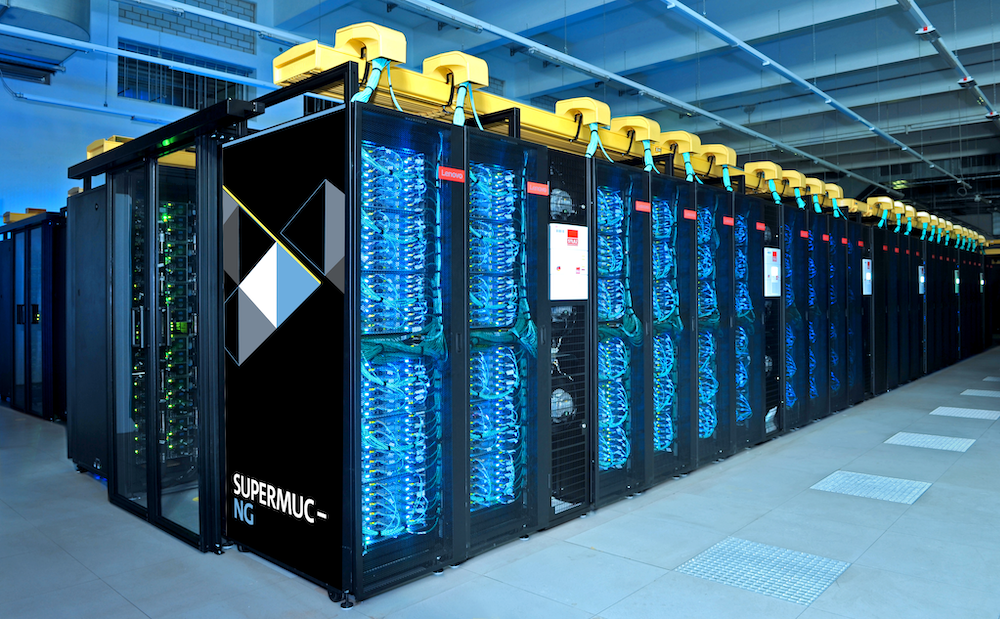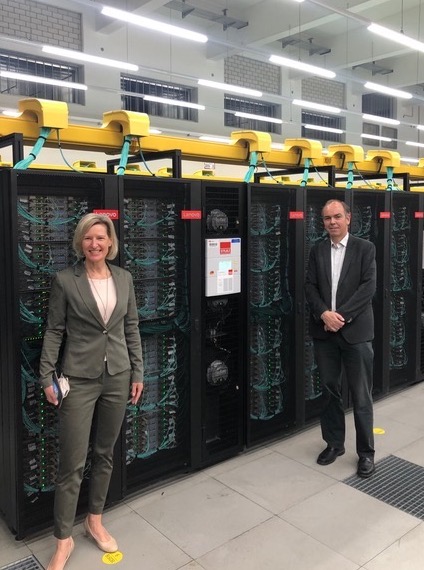LRZ-Newsletter Nr. 06/2020 of June 4. 2020

Our Topics:
- News
- Workshops and Events
- Job Opportunities
- More to Read
- Informations about the LRZ-Newsletter
- Imprint
News
Attack on Supercomputers
 In mid-May, the Leibniz Supercomputing Centre
(LRZ) and other scientific computing centres sealed themselves off.
They took their supercomputers
off the network and thus stopped external access to their resources:
"Someone has penetrated our systems and manipulated them", Professor
Dieter Kranzlmüller, director of the LRZ, explains this step.
Stuttgart,
Jülich, Karlsruhe and other High Performance Computing (HPC) centres in
Germany and Europe also
reported similar attacks. In the meantime, the systems are slowly being
reconnected to the Internet - but users will still have to reckon with
restrictions.
In mid-May, the Leibniz Supercomputing Centre
(LRZ) and other scientific computing centres sealed themselves off.
They took their supercomputers
off the network and thus stopped external access to their resources:
"Someone has penetrated our systems and manipulated them", Professor
Dieter Kranzlmüller, director of the LRZ, explains this step.
Stuttgart,
Jülich, Karlsruhe and other High Performance Computing (HPC) centres in
Germany and Europe also
reported similar attacks. In the meantime, the systems are slowly being
reconnected to the Internet - but users will still have to reckon with
restrictions.
In Garching, the State Office of Criminal Investigation and the General Prosecutor's Office are now investigating together with a five-member security team from the LRZ who is behind the attacks, whether data has been stolen or falsified and for what purpose. In close coordination with each other, the affected data centres are looking for traces and clues. Meanwhile, the media and the HPC community are speculating about intentions: Should research results on anti-corona drugs be tapped, or did hackers want to gain access to computer resources in order to mine or sell crypto currencies? "These are all mere theories", Kranzlmüller explains.
Business Hours for the SuperMUC-NG
The fact is: SuperMUC-NG continues to model and simulate. In agreement with the investigating authorities, users can soon retrieve results online again: but only from 8 a.m. to 6 p.m. They will need new passwords and SSH keys and will have to reckon with further restrictions. "It annoys and depresses me that science is being slowed down by these attacks and that some projects are being unnecessarily delayed as a result", says Kranzlmüller in an interview on the attacks and on security in supercomputing on the LRZ website. (vs)

Interest in Quantum and Supercomputing
With mask, due distance and with many questions, the CSU politician Professor Dr. Angelika Niebler visited the SuperMUC-NG and learned about the possibilities of High Performance Computing (HPC) on 19 May 2020 at the Leibniz Supercomputing Centre (LRZ). Niebler was accompanied by Axel Thierauf, member of the supervisory board of the Finnish start-up IQM Quantum Computers: "The SuperMUC can make forecasts on corona virus development, it can show scenarios on climate change and optimise autonomous driving," Niebler wrote enthusiastically after her visit to her Facebook-page.
Niebler, who as an honorary professor at the University of Applied Sciences also deals with business and patent rights, and start-up investor Thierauf were particularly interested in how HPC is advancing quantum computing. Supercomputers are already testing the first tools for the next computer generation. SuperMUC-NG also simulates the working methods of quantum computers so that they can be researched and optimized. As a European politician, Niebler is convinced that Europe needs its own quantum computers. "Quantum computers will fundamentally change every process, every product and every service," she writes, "The competitive advantage for companies using quantum computers is immense. Europe does not yet have a well-known manufacturer. But we need a European approach to remain independent and competitive." (vs)
Deutsches Museum Trusts DFN and LRZ
Marvel at submarines and planes, walk through the mine or look at the first computers: Although the Deutsches Museum can be visited again since May 11, the number of visitors is limited for the time being, some departments will remain closed. Like other exhibition venues, the museum, which illustrates technology on 25,000 square meters, has opted for digital events during the Corona lock-down. And these will continue to be available in the future - with the help of the Leibniz Supercomputing Centre (LRZ) and its partner, the Verein zur Förderung eines Deutschen Forschungsnetzes (DFN).
The Deutsches Museum has recently become a cluster participant, is supported by the LRZ with IT services and has booked the DFNInternet package: "Digital events are - especially in times of closed museums - an important part of our communication strategy and are increasingly offered by the Deutsches Museum," says Thomas Veicht, Head of Information Technology. "As a research museum of national importance, the Deutsches Museum depends on a modern and reliable IT ecosystem. The cooperation with LRZ and DFN gives us access to a large number of tailor-made communication applications, which it would be very difficult for us to provide our employees with the necessary quality and quantity on our own."
Internet Services in Demand
Corona has accelerated further partnerships: Also the University of Music and Theatre now relies on the internet services that the LRZ offers in cooperation with the DFN-Verein. In addition, TUMint.Energie, a holding company of the Technical University of Munich (TUM), has recently placed its trust in this IT service. The Internet services of DFN are currently in great demand, because they enable reliable video conferences with many participants and offer certified security to the institutions. In total, the LRZ now supports 16 research institutions and 11 cluster participants within the scope of DFN services and offers its IT services at ten locations in Bavaria. Since mid-March, LRZ has been supporting DFN-Association with its Compute Cloud: Ten virtual servers boost DFN's bandwidth for the rapidly growing number of video and audio conferences. (vs)

Figures of the Month
Corona is a little like Christmas. At least when it comes to network capacity utilization: Because researchers, students and also the employees of the Leibniz Supercomputing Centre (LRZ) now work from home and research and communicate online in their own Wireless Local Area Network (WLAN), Eduroam, for example, is hardly required. At the end of March, only 273 people were surfing the WWW via this network at the same time, fewer than at Christmas. But on 24 November 2019 there were more than 43,000, and Eduroam is now registering around 5000 simultaneous users again. Due to the homework the amount of data flowing through the router backbone of the MWN decreased: While in January the peak was more than 2000 terabytes per day, this number was halved by the middle of April, to rise to 1500 terabytes at the beginning of the semester, in early May - that is about the same level as last year.
However, the development of simultaneous sessions in Virtual Private Networks (VPN) is the opposite: Usually, until March, about 2000 users simultaneously accessed the Munich scientific network with a VPN client. After March 14, however, the number of active concurrent sessions rose rapidly to 5000, only to settle at 6000 or more. It is foreseeable that this will remain so for the time being, because research, study and work will continue to be done at home. (vs)

Workshops and Events
Exciting Guests at the BQCX Meeting
Of course, after a good 10 weeks of working from home because of Corona, everyone longs for personal meetings. On the other hand, video conferences brings the world closer: For example, the Bavarian Quantum Computing eXchange network of the Leibniz Supercomputing Centre (LRZ) welcomes Dr. Travis Humble, Director of the Quantum Computing Institute and researcher at the US-American supercomputing center Oak Ridge National Laboratory (ORNL), for its next (virtual) meeting on June 10th from 4 pm. In addition, Dr. Max Henderson, head of the research department at Rigetti Computing in Berkley (USA), will talk to the participants about new computer technology. The event will be broadcast by Munich-based Startup Streavent, a spin-off of the Technical University of Munich (TUM) - this has the positive side effect that even more interested parties, including from abroad, can register for it than usual.
New technology, prominent guests and exciting topics will be on the agenda at the BQCX meeting on June 10, 2020: Humble's presentation will show the possibilities of how supercomputing can be accelerated with the help of quantum mechanics. At ORNL they are already using the latest hardware and software developments and are already developing algorithms for simulating research results from chemistry, nuclear physics and applied mathematics. The ORNL already has the first tools for quantum computing, with which supercomputers can process even more data and produce results even faster.
Henderson,meanwhile, is working on data processing with quantum computers: Next-generation computer systems will process even more data and therefore need new algorithms or artificial intelligent systems. Henderson will show how Big Data and Data Science work with quantum computers, also he describes the first methods for research, some of them are already being used in industry.
Participation in the next BQCX meeting on June 10. 2020 from 4 pm is free. Information and registration

ISC-HPC: Digital Overview of Supercomputing
 Like all events, this year's ISC-HPC in
Frankfurt has been
cancelled. That is the bad news. The good news follows: The organizers
have put together a fine digital online program all about super- and
quantum computing for the four days from June 22 to 25.
Access to the program is free of charge after registration and will
remain so until 14 days after the event. The registration
period has just begun.
Like all events, this year's ISC-HPC in
Frankfurt has been
cancelled. That is the bad news. The good news follows: The organizers
have put together a fine digital online program all about super- and
quantum computing for the four days from June 22 to 25.
Access to the program is free of charge after registration and will
remain so until 14 days after the event. The registration
period has just begun.
Insights into the Technology and Practical Tools
Of course, colleagues from the Leibniz Supercomputing Centre (LRZ) will also be involved in the digital ISC-HPC: Martin Schulz, Professor at the Technical University of Munich (TUM) and Director of the LRZ, is co-chairman of the scientific programme this year and will also present two of his research projects together with colleagues: They focus on the main memory design of supercomputers and the improvement of performance and storage capacities as well as the efficient use of energy.
Vytautas Jancauskas and Jalal Lakhlilili prepare a video to introduce the EasyVVUQ software framework. This is a tool library of various programs for High Performance Computing (HPC) that helps to verify, validate and quantify statistical uncertainties that arise in large scale simulations and visualizations. EasyVVUQ was developed within the project "Verified Exascale Computing for Multiscale Applications" (VECMA), which is funded by the EU, and is already usable.
Controlling Supercomputers
The project paper of the Energy Efficient HPC Working Group (EEHPCWG), in which Michael Ott is involved, also deals with the monitoring of HPC systems. The working group looked at the different monitoring programs of supercomputing centers and compared them. On the same topic, the first international workshop on Monitoring and Operational or Working Data, MODA, is also taking place within ISC-HPC, in which Daniele Tafani is involved.
Finally, Salvatore Cielo will present the technical details and background of the visualization of an interstellar turbulence, which was created last year on the basis of astrophysical data from the University of Canberra and which was shortlisted for an award at the international SC fair in the USA. In his presentation, Cielo will focus in particular on useful programs from Intel's OSPray library, for example, which have been helpful in large-scale simulation and visualization. (vs)
Optimize HPC Codes
Through code optimization, the latest high-performance computer systems can be used even more efficiently. In this three-day online course offered by PRACE from June 8 to 10, 2020, participants will learn how to improve their own codes. They will be introduced to different techniques and methods for activating new hardware features and learn how to use the so-called roof line model to visualize their research data. Practical exercises alternate with theoretical learning units in this online course. On the last day the motto is: "Bring Your Own Code" and optimize it with the support of experienced experts. Information and registration
Introduction to Hybrid HPC Programming
Most HPC systems are clusters of shared storage nodes. To use such systems efficiently, both memory consumption and communication time must be optimized. A three-day workshop offered by PRACE from June 17 to 19, 2020, therefore leads into hybrid programming, which combines distributed memory parallelism on the node link (e.g. with MPI) with shared memory parallelism within each node (e.g. with OpenMP or MPI-3.0 shared memory). In this course the strengths and weaknesses of several parallel programming models on clusters of SMP nodes are analyzed, with a focus on multi-socket multicore systems in highly parallel environments. Information and registration
Clever Use of FPGA
Field Programmable Gate Arrays can accelerate core data center workloads and can be quickly reprogrammed. This versatility helps make supercomputers better utilized and more energy efficient. In the online course offered by the LRZ in cooperation with Intel on June 19, 2020, interested parties will learn how to use the Intel® oneAPI Base Toolkit and the Intel® FPGA Add-On for programming FPGA. Furthermore, they will learn how a source code from Data Parallel C++ (DPC++) becomes a user-defined computing unit and which resources they can use in the FPGA side. Information and registration
C++ for Software Engineers
This online training for advanced users introduces the software development with the programming language C++. It enables programmers to create professional, high-quality code. The course provides insight into the various concepts and idioms of C++, such as object-oriented programming, functional programming, generic programming, and provides guidelines for developing efficient C++ code. It is organized in cooperation with KONWIHR, the "Competence Network for Scientific Supercomputing in Bavaria", on three Saturdays, June 20, June 27 and July 4, 2020, from 9 a.m. to 5 p.m. The course will be held in English and costs 25 Euro. To pay, an account should be created at the RRZE Training Centre. How this works is explained online. Information about the course and registration.
Optimize OpenCL Programs for Intel FPGA
Field Programmable Gate Arrays (FPGA) accelerate data center workloads and can be quickly reprogrammed. The online course on June 25, 2020 will cover various optimization techniques for implementing high-performance OpenCL applications on FPGA. Participants will learn how to use various debugging and analysis tools, how to use kernels and FPGA more efficiently, as well as good FPGA coding and optimization practices. Information and registration
Learning Online Supercomputing
Beginners and advanced users can learn the tools and tricks for supercomputing at their own pace and independently of time: For example, PRACE currently offers five free Massive Open Online Courses. These are only available for a limited time and can be completed in self-study. Those interested can enter supercomputing with the MOOC, learn the programming language Python or learn how to control Big Data with the programming language R and Hadoop or how to detect errors in applications. The MOOC can be found online at Futurelearn. PRACE offers even more courses on its website, but these courses require a university admission. Please check the admission requirements before you register.
Until the end of 2020, the Gauß Allianz will also offer almost 30 online courses or face-to-face workshops on supercomputing and the development of HPC applications. The HPC calendar provides information and registration details.
Job Opportunities
You will find an international and diverse team in Garching, which is constantly growing. If you don't find a suitable job profile below, please visit the career page of the Leibniz Supercomputing Centre or send an unsolicited application. We are LRZ - and curious about you!
- IT Specialist for clientmanagement MAC and mobile devices
- IT-Specialist for the clientmanagement Windows
- IT-Security Architect
- Software-Developer Web/PHP
- Student Assistant for HPC User Administration
- Student Assistant Development Web-Backend and mobile app
- Student Assistant Web, JavaScript, TypeScript
- Student Assistant for the Licence Team
- Student Assistants for the Service-Desk
More to Read
Here you will find links to latest information from the german-european supercomputing community and our cooperation partners
- Publications of the Gauss Centre for Supercomputing (GCS): GCS-News and Inside
- Infoletters of the Gauß-Allianz: Ausgabe 80
- PRACE: Annual Report, PRACE Digest
Informations about the LRZ-Newsletter
- The LRZ Newsletter is published in German and English. You can find the latest and former editions on the LRZ-Website.
- You have problems displaying the newsletter? Please send a short description of your problem to <pr-team_AT_lrz.de>. Thank You!
- You can subscribe or unsubscribe the LRZ-Newsletter via our website.
- Current information about the LRZ and about courses and events can also be found on Twitter and LinkedIn.
Imprint
- Herausgeber:
- Leibniz-Supercomputing Centre of the Bavarian Academy of Science and Humanties
- Boltzmannstraße 1
D-85748 Garching - Phone:
- +49-89-35831-8000
- Telefax:
- +49-89-35831-9700
- E-Mail:
- pr-team_AT_lrz.de; newsletter_AT_lrz.de
- Twitter: https://twitter.com/LRZ_DE
- LinkedIn: https://www.linkedin.com/company/leibniz-supercomputing-centre/
- Editorial Office:
- PR Team
- Photos, Graphics:
- Deutsches Museum, Matthieu Joannon/Unsplash, LRZ
